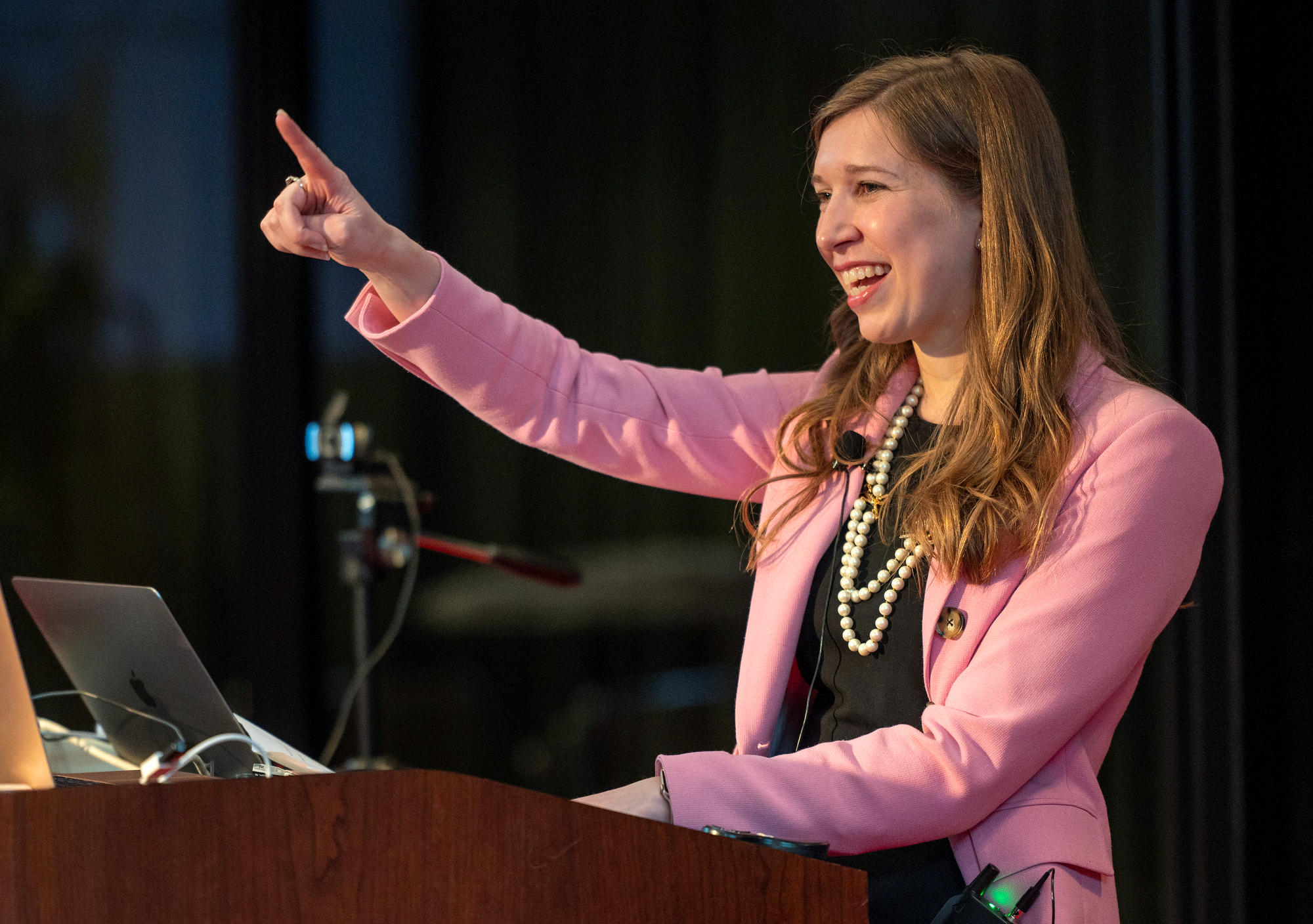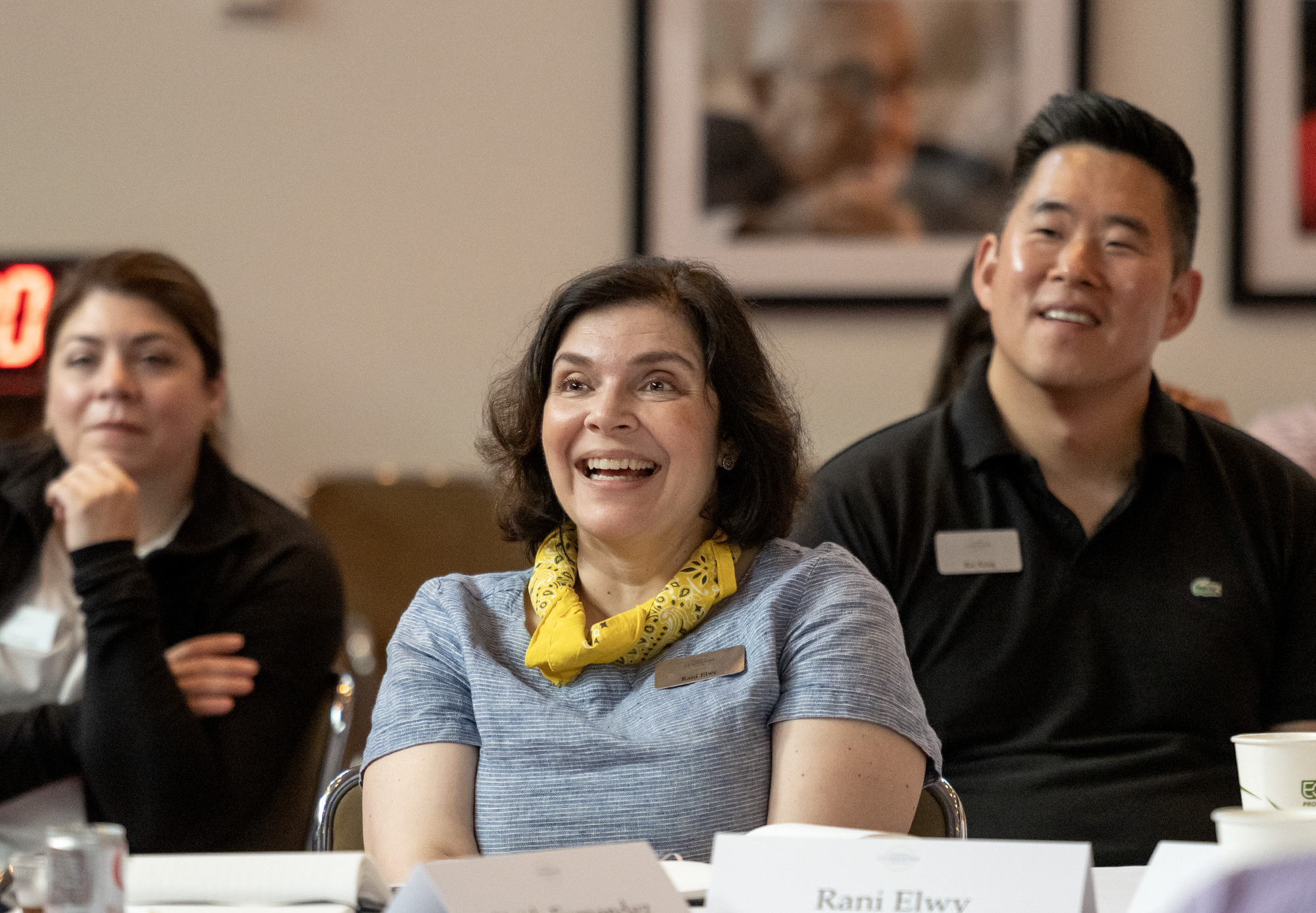Amy Kroll, 2020 Presidential Leadership Scholar and Founder and Executive Director of the Lyndon B. Johnson Women’s Campaign School at the University of Texas at Austin, shares her passion for supporting women in politics and the crucial lessons she learned on decision-making through PLS.
Please tell us a little bit about yourself and your personal leadership project.
I love politics! Not the “horse race” of politics, but the fact that politics is where people get to impact their government. Through voting, volunteering, attending political party meetings, and running for office, people have a say in their future. I spent nearly a decade working in politics at the [Democratic National Committee], the Texas Democratic Party, and in U.S. Senate and congressional races. I saw women stepping up to serve, but I also saw and experienced many of the barriers holding women back. That led me to my personal leadership project: founding the LBJ Women’s Campaign School at the University of Texas at Austin (LBJWCS). We are a nonpartisan program that supports women in politics by training and empowering change-makers to lead in the political arena.
I’m also a new mom, which has deepened my passion for this work. I feel driven to build a stronger democracy for my son’s generation and have seen firsthand the need for better public policy for expectant parents and parents of young children.
I’m from Northern California, an Air Force spouse, and I live in the Washington, D.C., area with my husband Louis, our 1-year-old son Archer, and our dog Julian.
Please give us an update on what you have been working on since completing the Presidential Leadership Scholars program.
When I applied for PLS, I was a master’s student at the LBJ School of Public Affairs, and I had a goal of turning my personal leadership project, founding the LBJ Women’s Campaign School, into a full-time job. I am proud to say that, thanks in part to the support of the PLS community, I now work full time as Executive Director of the LBJ Women’s Campaign School! Since we launched in 2020, we have trained over 300 change-makers on all the skills needed to run a successful political campaign.
As Mike Hemphill [Director of the Presidential Leadership Scholars program] always says, “The journey is the destination.” I love seeing the leaders in our program leave class feeling inspired to take action and with the toolbox to make it happen.
Since we launched, our alumni have been candidates in 40 campaigns, and 86 have become political appointees. They have run for school board, city council, Congress, state legislatures, and statewide office in Texas, Arkansas, Maryland, California, and Michigan. Eight Presidential Leadership Scholars have been part of our program, as well. I love the cross-collaboration with PLS and LBJWCS because PLSers understand the importance of working across differences and prioritizing service to others!
Which lessons learned during the Presidential Leadership Scholar program have stayed with you the most, and how have you put them into action?
In January 2020, Secretary Sylvia Burwell [former U.S. Secretary of Health and Human Services] shared advice that resonated deeply with me. She said, “Decision-making is like paragliding. You gather all the information you can, and then you jump.” As a first-time Executive Director of a new program, I needed to make many decisions: What should we name this new program? Do we need our own social media pages, or could we post to the university’s accounts? Who should speak to our participants? What would go on the application? Some of these decisions were easy, but others were more difficult and impacted the organization for years to come.
A few months after hearing Secretary Burwell’s advice, I faced a critical decision as the global pandemic began: Should we delay the launch of the LBJ Women’s Campaign School, go online, adopt a hybrid model, or take another approach? I gathered all the information and presented it to the Assistant Dean so she could make the final decision. She reminded me that as Executive Director, the decision was mine. Reflecting on Secretary Burwell’s words, I jumped! I realized that elections don’t stop, and neither would we. We launched online and planned an in-person gathering later, though it, too, was canceled due to the ongoing pandemic. Despite the challenges, I’m glad we pushed forward. The virtual format allowed us to bring in speakers from across the nation, including [former] White House Communications Director Jennifer Palmieri and [former Texas] State Senator Florence Shapiro, who might not have joined us otherwise.
I feel so grateful to have had the lessons and the community of PLS during the pandemic and beyond. My participation in the program gave me the confidence to move forward during an uncertain time and the network to help the newly minted program thrive.
What drives your work supporting women interested in running for office and for campaign senior staff positions, and what is your advice for women leaders who are curious but hesitant to enter the political arena?
As part of one of our PLS sessions, Mike Hemphill walked us through an exercise to identify our top value: Mine was fairness. Women comprise 51% of the population but represent less than 30% of elected officials nationwide. It’s easy to see that that is not fair. Our nation’s foundation was built on the belief that “all [people] are created equal,” but so far, we are still striving toward that promise. My hope is that we can be a part of changing this inequity for the better.
If you’re curious about politics but hesitant to dive in, my advice is simple: Get involved now! There are countless opportunities to make a difference, especially in 2024. Campaigns nationwide seek volunteers who can contribute their skills, expertise, and time. For instance, I recently joined the Harris-Walz campaign as the national fundraising chair for military families – a volunteer role where I get to help elect the first woman president while encouraging military families to engage in politics. You, too, can support candidates in your community, whether by knocking on doors, registering voters, making phone calls, hosting fundraisers, creating social media graphics, or mobilizing volunteers. Getting involved now is the best way to prepare for a future run for office!
Many don’t realize there are over 500,000 public offices to run for and over 5 million boards and commissions to join. To put that in perspective, there are just over 200,000 dentists in the U.S., and everyone needs a dentist! Whether you want to run for office, work as political staff or volunteer, there’s a place for you.
If you’re ready to take the next step, consider applying to the LBJ Women’s Campaign School. We will help you get started! Our applications open in September.
You recently published an op-ed in the Austin American-Statesman on how Texas policies are “failing moms and young families.” What should policymakers in the state prioritize to protect women in the workplace?
At PLS, we learned about George H.W. Bush’s important work passing the Americans with Disabilities Act (ADA). Unfortunately, pregnant workers are not covered under this policy because pregnancy is not usually a disability. However, pregnant workers may need workplace accommodations like protection against toxic chemicals, appropriately sized uniforms, additional bathroom breaks, or flexible hours due to morning sickness and prenatal appointments. The federal Pregnant Workers Fairness Act (PWFA), which went into effect in 2023, fixes this gap in the ADA, but Texas will no longer enforce this law for state workers. Additionally, as a UT-Austin employee, I, along with the 14,599 other staff members, don’t have access to any paid family leave.
With policies like this, Texas lawmakers are sending a message that is loud and clear: Moms are not welcome in the workplace. This makes it harder for the state to recruit top talent and for new parents to care for our youngest Texans. I hope you will join me in urging Texas lawmakers and university leadership to reinstate the protections for pregnant state workers under the PWFA and Protect the PUMP Act (which protects lactating mothers) and expand federal family leave benefits to state and university workers. Issues like this remind me why having women’s voices in leadership positions is so important.

